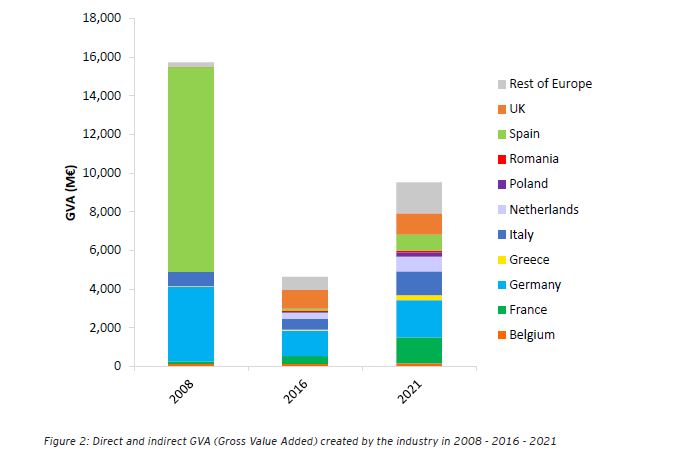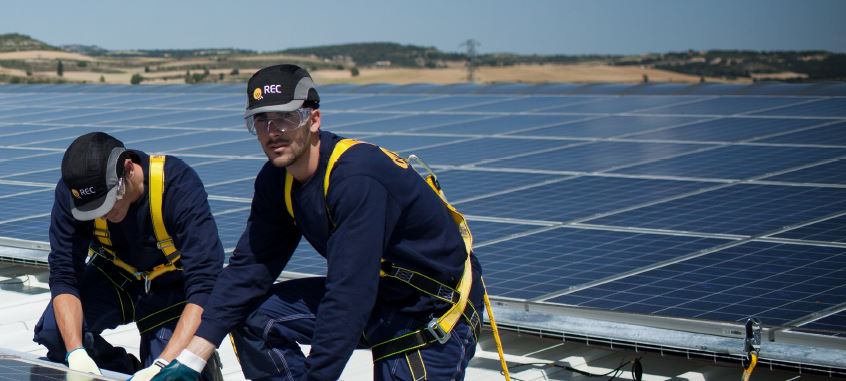After years of uncertainty, a new EY report confirms that the European solar industry is back on track. The report shows that with the right policies for solar in Europe, we could see exponential growth in terms of jobs and wealth creation through to 2021.
There is little doubt the European solar sector has been severely challenged since the first solar boom came to a halt in 2011-2012. Since then, we have witnessed retrospective polices and a sluggish transition phase that have put a break on solar deployment in Europe. SolarPower Europe, together with EY, has published a new report ‘Solar PV Jobs & Value Added in Europe’, which shows that we are at the onset of a solar jobs revival.
In 2016, the PV sector in Europe represented more than 81,000 full time jobs (FTE), and more than 4,600M gross value added (GVA). By 2021, the workforce is estimated to reach over 174 000 FTE with 9,500M in GVA. This is an impressive increase of 145% and 105% for FTEs and GVA compared to 2016.

What is behind the newfound growth in European solar?
The boost in jobs between 2016 and 2021 is driven by yearly increases in new installed capacities forecast, resulting from European countries’ strategic plans to increase the shares of renewables in their energy mix. Simply put, ambitious targets mean more jobs. Spain, Poland, Italy and France are all examples of countries which have recently amped up their renewable ambitions, and are all expected to see a major increase of jobs as a result.
While this trend is moving in the right direction, we could still do so much more to grow jobs and revenue from solar.
The report shows that if we increased the European renewable energy target from the current 27% to a more ambitious 35%, an impressive 56% more jobs could be created in the solar industry alone – bringing the total number of jobs in the European solar industry to over 350 000. From upstream to downstream, innovation to installation, electricity to transport, and SME’s to massive corporations – solar jobs are for everyone. As employment, and especially youth employment, is currently one of Europe’s main concerns, the potential for the solar industry to provide this employment needs to be taken seriously. Not only can solar provide much needed secure and clean jobs to European citizens, it is also employs the highest number of young workers out of all the energy sectors. Solar is therefore a perfect opportunity to invest in our youth – in terms of both providing them with job prospects and ensuring they have a clean, sustainable future.
Popular content
With the right policies in place, this growth can be pushed even further. If the trade measures on modules and cells from Asia were to be removed, we could see an additional 45,500 jobs created across the European continent in a year’s time. The new report finds that the manufacturing of Balance of Systems (BoS) represents nearly half of the upstream share of jobs and GVA creation in 2016. Lifting the trade measures would provide much needed relief for this sector, as the duties have applied price pressure on companies producing steel mounting frames, trackers, inverters and junction boxes – all the necessary components to create a complete solar PV system.
Moreover, while the average PV system price in Europe decreased by 23% in 2016 compared to 2014, this could drop even further with the removal of the Minimum Import Price (MIP). Lower system prices would result in more demand at the consumer level and consequently more employment in the European solar market throughout the value chain.
It is clear from this report that we need an overarching industrial competitiveness strategy for solar for Europe.
Rather than constraining the solar value chain and creating unforeseen obstacles for so many European companies, in both the upstream and the downstream, we need a more tailored and nuanced approach to our young technology. SolarPower Europe is pioneering an industrial competitiveness strategy for solar in Europe which aims to support 300,000 direct and indirect jobs by 2030. This would ensure Europe’s spot as the world leader in renewables as we become the hub of innovation for existing and next generation solar technologies, manufacturing and services.
The European Commission’s Clean Energy Package is set to create a sustainable and dynamic solar market in Europe for the next decade, but this can be developed even further with The Clean Energy Industrial Competitiveness Forum. This Forum is a huge opportunity for solar in Europe as it can provide the solar sector the means to build long-term and competitive jobs in Europe. If we get all this right, expect the next generation of workers to be powered by solar.
Author: Christian Westermeier, President, SolarPower Europe
This content is protected by copyright and may not be reused. If you want to cooperate with us and would like to reuse some of our content, please contact: editors@pv-magazine.com.


3 comments
By submitting this form you agree to pv magazine using your data for the purposes of publishing your comment.
Your personal data will only be disclosed or otherwise transmitted to third parties for the purposes of spam filtering or if this is necessary for technical maintenance of the website. Any other transfer to third parties will not take place unless this is justified on the basis of applicable data protection regulations or if pv magazine is legally obliged to do so.
You may revoke this consent at any time with effect for the future, in which case your personal data will be deleted immediately. Otherwise, your data will be deleted if pv magazine has processed your request or the purpose of data storage is fulfilled.
Further information on data privacy can be found in our Data Protection Policy.